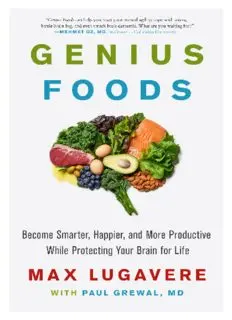
Genius Foods: Become Smarter, Happier, and More Productive While Protecting Your Brain for Life PDF
Preview Genius Foods: Become Smarter, Happier, and More Productive While Protecting Your Brain for Life
Dedication This book is dedicated to the first genius I ever met: my mom. Contents Cover Title Page Dedication Introduction How to Use This Book Part 1: You Are What You Eat Chapter 1: The Invisible Problem Genius Food #1: Extra-Virgin Olive Oil Chapter 2: Fantastic Fats and Ominous Oils Genius Food #2: Avocados Chapter 3: Overfed, yet Starving Genius Food #3: Blueberries Chapter 4: Winter Is Coming (For Your Brain) Genius Food #4: Dark Chocolate Part 2: The Interconnectedness of It All (Your Brain Responds) Chapter 5: Healthy Heart, Healthy Brain Genius Food #5: Eggs Chapter 6: Fueling Your Brain Genius Food #6: Grass-Fed Beef Chapter 7: Go with Your Gut Genius Food #7: Dark Leafy Greens Chapter 8: Your Brain’s Chemical Switchboard Genius Food #8: Broccoli Part 3: Putting Yourself in the Driver’s Seat Chapter 9: Sacred Sleep (and the Hormonal Helpers) Genius Food #9: Wild Salmon Chapter 10: The Virtues of Stress (or, How to Become a More Robust Organism) Genius Food #10: Almonds Chapter 11: The Genius Plan Chapter 12: Recipes and Supplements “Cheesy” Scrambled Eggs Jamaican Me Smarter Grass-Fed Picadillo Pan-Seared Wild Alaskan Salmon with Turmeric, Ginger, and Tahini-Miso Banging Liver Insanely Crispy Gluten-Free Buffalo Chicken Wings Turmeric-Almond Chicken Fingers Sautéed Greens Better Brain Bowl “Cheesy” Kale Salad Brain-Boosting Raw Chocolate Acknowledgments Resources Notes Index About the Authors Copyright About the Publisher Introduction Before you play two notes learn how to play one note—and don’t play one note unless you’ve got a reason to play it. –MARK HOLLIS If you’d have told me a few years ago that I’d one day write a book about optimizing the brain, I would have been sure you had mistaken me for someone else. After I switched my college major from premed to film and psychology, the idea of a career in health seemed unlikely. This was compounded by the fact that soon after I graduated, I became entrenched in what I considered a dream job: a journalist and presenter on TV and the Web. My focus was stories that I felt were underreported and could make a positive impact on the world. I was living in Los Angeles—a city I’d idolized as an MTV-watching teen growing up in New York—and had just ended a five-year stint hosting and producing content for a socially conscious TV network called Current. Life was great. And it was all about to change. As much as I enjoyed the Hollywood life, I’d often find myself making trips back east to see my mom and two younger brothers. In 2010, on one of those trips home, my brothers and I noticed a subtle change in the way my mother, Kathy, walked. She was fifty-eight at the time and had always had a spirited way about her. But suddenly, it was as though she were wearing a space suit underwater— each stride and gesture looked like a purposeful, conscious decision. Though I know better now, back then I couldn’t even make the connection between the way she moved and her brain’s health. She also began offhandedly complaining of mental “fogginess.” This too was lost on me. No one in my family had ever had memory problems. In fact, my maternal grandmother lived to ninety-six and her memory was sharp until the end. But in my mom’s case, it seemed as if her overall processing speed had slowed, like a Web browser with too many open tabs. We started to notice that when we would ask her to pass the salt at dinner, it would take her a few extra beats to register. While I chalked what I was seeing up to “normal aging,” deep down I had the chilling suspicion that something wasn’t right. It wasn’t until the summer of 2011 during a family trip to Miami that those suspicions were confirmed. My mom and dad had been divorced since I was eighteen, and this was one of the few times since then that my brothers and I were together with my parents under the same roof—seeking respite from the summer heat in my dad’s apartment. One morning, my mother was standing at the breakfast bar. With the whole family present, she hesitated, and then announced that she had been having memory problems and had recently sought the help of a neurologist. In an incredulous but playful tone, my father asked her, “Is that so? Well then, what year is it?” She stared at us blankly for a moment, and then another. My brothers and I chuckled and chimed in, breaking the
